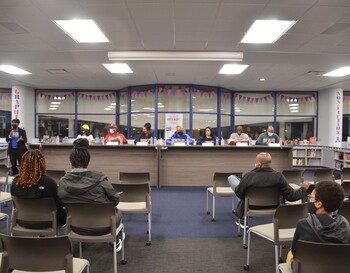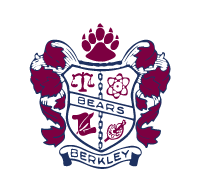Berkley High School Hosts HBCU Night

Berkley High School Hosts HBCU Night
On Tuesday, November 9, the Berkley School District community was invited to attend Historically Black Colleges and Universities (HBCUs) night hosted by Berkley High School and the Berkley African American Parent Network. Inspired by a similar event at Norup last year, BHS Assistant Principal Evelyn Coleman, along with BHS College & Career Counselor Christina Belsky, organized and facilitated this event.
HBCU night included an open house with five colleges and four youth programs. Students and families were able to meet with representatives from these groups and learn more about what they offer. After the open house, families and students were welcomed into the library media center for a question and answer panel consisting of panelists from seven different HBCUs. Mrs. Coleman (proud Tennessee State University Tiger alumni) was the moderator for the panel.
Panelists included Erin Williams (Southern University alumni), Daren Mosely (Tuskegee University alumni), Sharise Crumley (Howard University alumni), Cedric Stokes (Tennessee State University alumni), Shamika Womble (Jackson State University alumni), QuanTez Pressley (Morehouse College alumni) and Eric Rayford (Rust College alumni).
To kick off the panelist portion of the event, Mrs. Coleman shared the following about HBCUs. “HBCUs have cultivated a space and place for people of all races to obtain an education for all over the last two centuries. Today 101 HBCUs remain. And they continue to nurture and develop the top scientists, scholars, politicians, and educators. You name it, we produce it,” she said.
Mrs. Coleman then asked the panelists to share about their HBCU experiences including why they chose to attend an HBCU, what campus life was like, what they say to people who question whether an HBCU experience would be “diverse enough,” and why students should choose to attend today. Here are a few quotes from the evening:
- “I was a minority everywhere I went… I never had the experience of a Black teacher. I wanted to go to school with and be taught by people who looked like me,” shared Ms. Crumley.
- “Black people are diverse in and of themselves. I went to school with Black people from France, from Senegal, Cape Verde, South America. You’ll get a diverse experience [at an HBCU],” said Mr. Pressley.
- “An HBCU will prepare you for whatever obstacles you may face in the world,” said Mr. Rayford.
Quick Facts About Historically Black Colleges & Universities
- Historically Black Colleges and Universities (HBCUs) were established to serve the educational needs of Black Americans. Prior to the time of their establishment, and for many years afterwards, Blacks students were generally denied admission to traditionally white institutions. As a result, HBCUs became the principle means for providing postsecondary education to Black Americans.
- As of 2021, there are 101 HBCUs located in 19 states, the District of Columbia and the US Virgin Islands that enroll almost 300,000 students.
- Over half of all Black American professionals are graduates of HBCUs with more than half of Black public school teachers and 70% of Black dentists having earned degrees at HBCUs.
- Some of the first HBCUs were established to train teachers, preachers and other community members.
- HBCUs significantly contribute to the creation of African American science degree holders: agriculture (51.6%), biology (42.2%), computer science (35%), physical science (43%) and social sciences (23.2%).
- Nine of the top ten colleges that graduate most of the African American students who go on to earn Ph.Ds are HBCUs.
- Notable HBCU graduates include Vice President Kamala Harris (Howard), Oprah Winfrey (Tennessee State), Samuel L. Jackson (Morehouse) and Stacey Abrams (Spelman).






